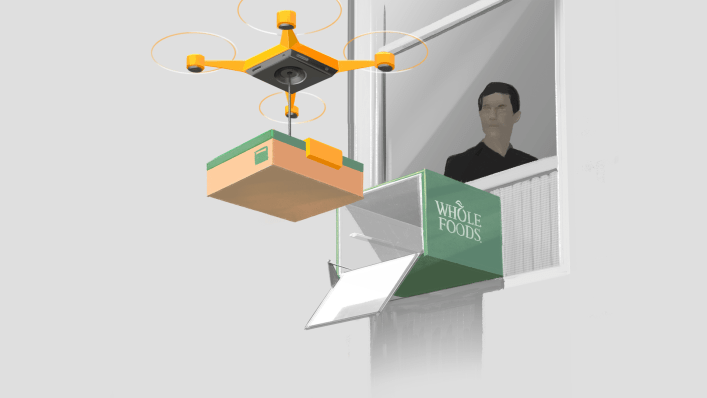A Wild Vision Of The Future Run By Amazon And Whole Foods
Drones. Shared refrigerators. Hydroponic garages. And never setting foot in a grocery store again.

Since Amazon bought Whole Foods for $13.7 billion, consumers have been left wondering what that partnership will ultimately look like. Will Whole Foods stores just become another face for Amazon’s anonymous distribution centers? Will Prime memberships include access to more local produce? Or will retail, as we know it, fundamentally change, as Amazon’s hyper efficiency mixes with the Whole Foods fresh, local mentality to create something entirely new?Austin-based design firm Argodesign is betting on the latter. As a thought experiment, the studio mocked up a provocative series of concepts suggesting what an Amazon Foods could look like, if powered by drones, Echo refrigerators, and a sharing economy model reminiscent of Airbnb or Uber.
Meet The Echo Fridge
Right now, you might order groceries through your Echo personal assistant, or reorder something through an Amazon Dash button. These items might arrive in a few hours or a few days. But what if Amazon/Whole Foods could move its stock from distribution centers and store shelves to your shelves, predictively, and adaptively?
That’s the idea of the Echo Fridge. It has an exterior-facing door. In suburban houses, it’s large, allowing a small vehicle to pull up. In urban areas, it’s a box about the size of an AC unit. Through this door, the fridge would take deliveries of food Amazon believes you will want. But you don’t pay for them unless you use them.
On the kitchen side of the Echo Fridge, you might see two doors. The door on the right would have Amazon’s suggested items, ready to eat. Move them to the left door–your personal space–and they’d be purchased automatically. Leave them, and they might be removed, delivered to a neighbor who wants that bag of oranges or bottle of ketchup.
“When we started looking at the whole problem, we started from the high level: improving distribution through robotics, and this centerpiece idea of making the refrigerator the point of sale,” says Mark Rolston, founder of Argodesign. “If you start with that point of logic, because of improved distribution, availability of robotics, and support of drones, you start to realize, the inventory in the store starts to not really matter. And the store doesn’t matter as it does today to host inventory.”
This is the fundamental shift of the concept–the store is no longer the store. Your home is now the store. And while, yes, it’s a slightly unsettling thought to not own everything in your fridge, where Argodesign takes this idea empowers the individual–as much as it enslaves them to Amazon’s will....MUCH MORE